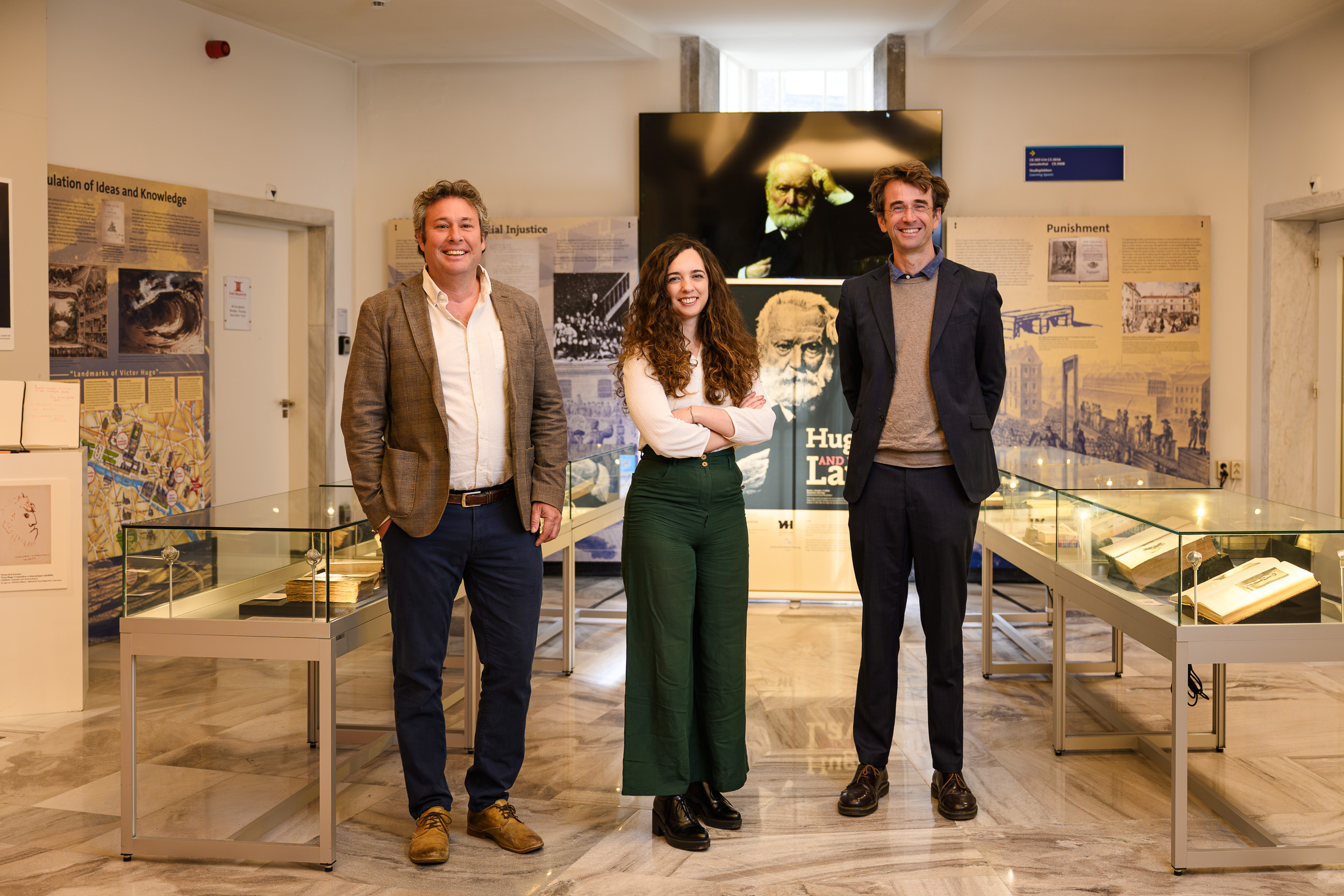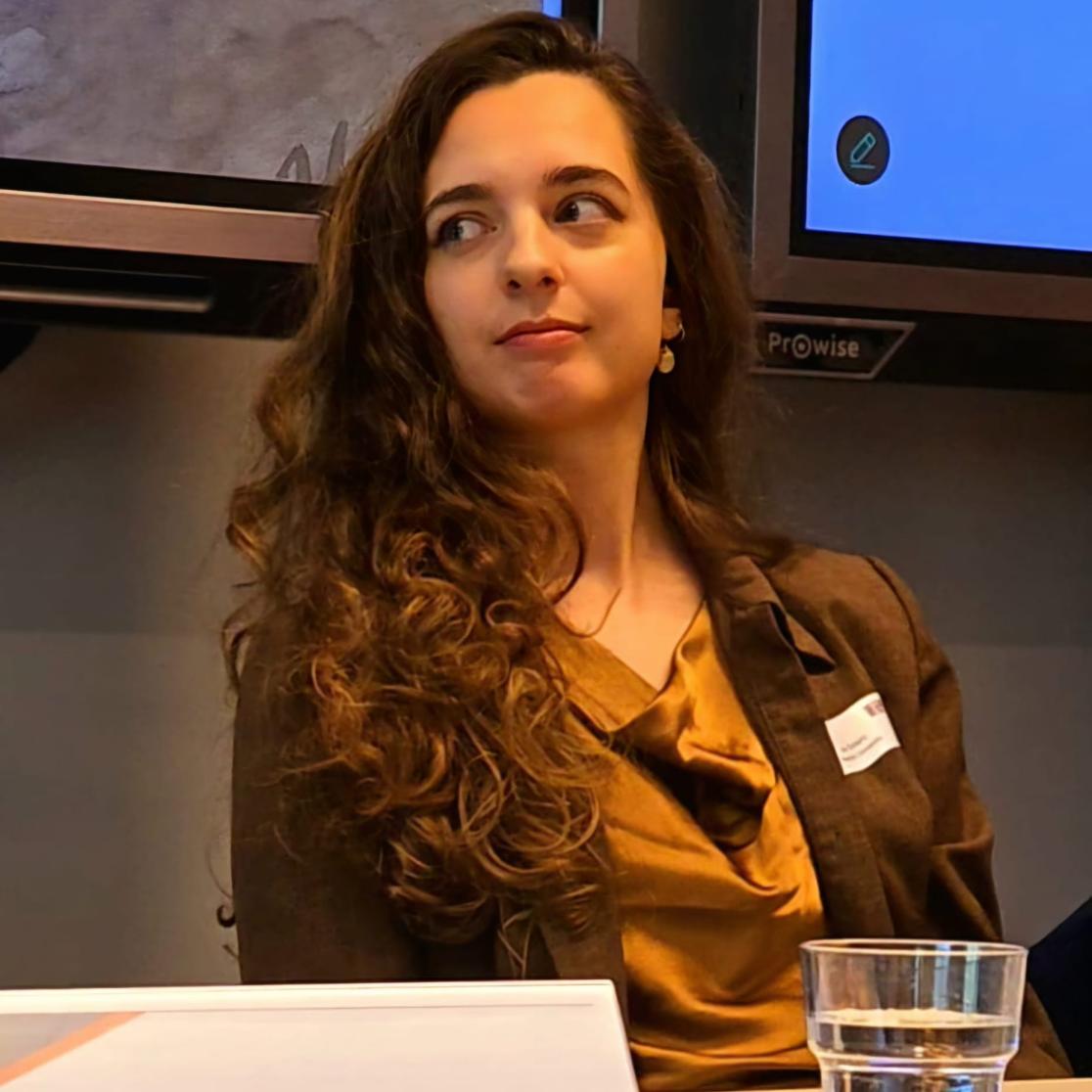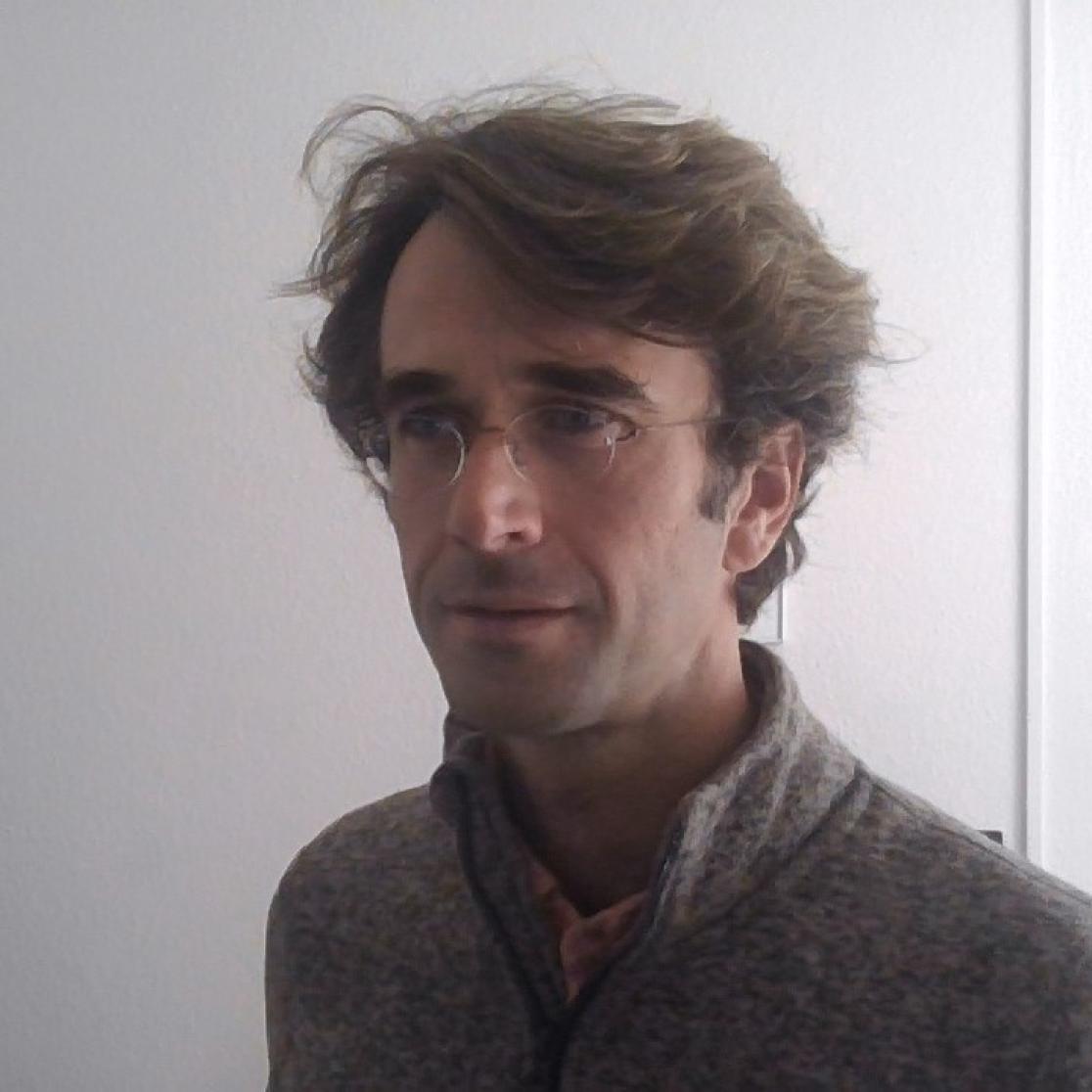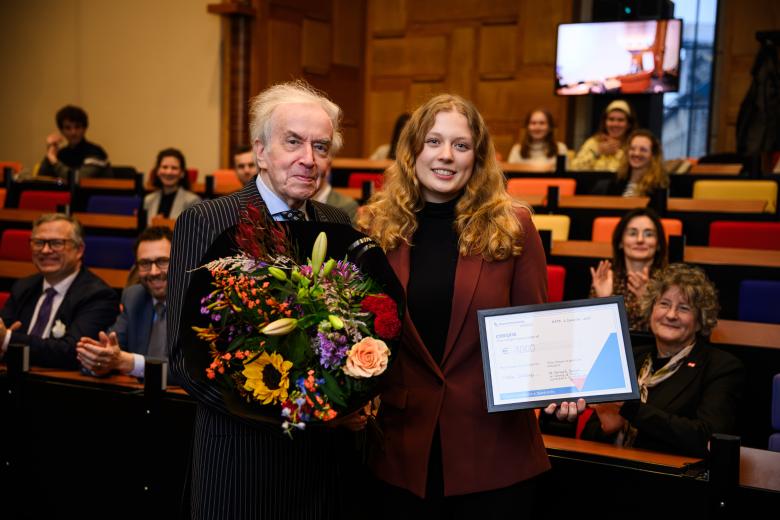Legal thought made relevant and entertaining
Popular culture influences legal philosophy and can end up changing the law itself. A case in point is 19th century novelist, poet, playwright, revolutionary, exile, and senator Victor Hugo – he of Les Misérables and the Hunchback of Notre-Dame fame. His conceptualisation of and influence on the law have been beautifully brought to life in the collaborative exhibition ‘Hugo and the Law’, which is now moving to the UM Library. Eline Couperus, Livia Solaro and Arthur Willemse from LAW represent the team behind the exhibition, which includes Agustín Parise and Franco Peirone from LAW, Odin Essers and Melissa Prinz from the UM Library, and Emilie Sitzia from FASoS.
“It’s incredible how current Victor Hugo still is,” says Livia Solaro, one of the organisers of ‘Hugo and the Law’. “All of the things he grappled with are still alive and present in our society. There’s an unbroken line between him and us.” The workshop and exhibition ‘Hugo and the Law’ were organised in a collaborative effort between members of LAW, the UM Library, and FASoS. Many of the team members are active in the Law & Popular Culture – Research Network, which also hosts regular roundtables, lectures, and their ‘Law in Stories’ events. “It’s a creative way of studying, researching and learning, says Arthur Willemse, “and people appreciate the playfulness.”
The text continues below the image.

Law and popular culture
Law, being an expression of the culture of a particular society, can be better understood against the backdrop of that culture. “This works both ways,” Eline Couperus explains, “seeing how the law impacts popular culture or, in this case, how Victor Hugo’s works have impacted laws or conceptions of justice.” The idea for this particular event came from a conversation between two other members of the Law & Popular Culture –Research Network, Franco Peirone and Agustín Parise, about the 150th anniversary of Actes et Paroles, a collection of Victor Hugo's political texts.
“It was a lot of work,” remembers Willemse. “Academic meetings are so easy to organise by comparison: you book the room and, if you want to go above and beyond, you order coffee and biscuits.” Still, it was more than worth it. Couperus explains that “academia is not just about desk research and writing articles for scientific journals, so we really savoured this chance to communicate ideas broadly and make research valuable beyond the university community. From the library to the faculties and colleagues, UM really allowed us to be creative and innovate – this is the first exhibition of its kind at LAW.”
“Academia is not just about desk research and writing articles for scientific journals, so we really savoured this chance to communicate ideas broadly and make research valuable beyond the university community.”
Eline CouperusMaking it real – 19th century Paris come to life
The team received support from LAW, FASoS, the UM Library, Stichting Wetenschappelijk Onderwijs Limburg (SWOL), and the Art and Heritage Committee (KEC). “We also established contact with the Maison Victor Hugo in Paris about using Victor Hugo’s visual works,” adds Couperus. Cultural education expert Emilie Sitzia coordinated the creation of a multisensory experience.
Original books were provided by curator Odin Essers and historian Melissa Prinz, from the Special Collections of the UM Library. The exhibition also includes videos, music, soundscapes, special boxes recreating the smell of revolutionary Paris – which apparently is largely unpleasant, with a surprising top note of cedar. From Key & Peele to Iron Maiden, from a Disney parody of Les Misérables to songs from the titular musical, visitors were invited on a journey across time and media.
Couperus is very happy with the results so far: “We received very positive feedback from within the faculty and also from external visitors.” Among other things, they reached out to the UM community and to high schools in the city to organise academic guided tours. “It really brings home the importance of experiential learning,” concludes Willemse. “Rather than me telling them things, it was mostly about them seeing the building and being carried away by the exhibition. Especially for young people who have grown up in the post-truth age of online fakery, there is something special about seeing the original works.”

Eline Couperus is a Junior Lecturer and Ph.D. researcher at the Department of Foundations and Methods of LAW at Maastricht University. Her research focuses on economic freedoms in a social Europe.
Victor Hugo’s works as relevant as ever
The opening of the exhibition was accompanied by an international, transdisciplinary workshop and a screening of the 2019 film Les Misérables. Solaro explains that while the movie’s plot does not harken back to the eponymous Hugo novel, it treats very similar themes: “Our colleagues Paula Lozada Alfaro and Janneke Westra selected this film; it focuses on police violence against disadvantaged citizens with immigrant origins, and it’s set in the commune of Montfermeil – the same place where Hugo wrote and set parts of Les Misérables. The film illustrates both societal evolution as well as the continuity and how relevant Hugo’s themes are to this day.”
In Hugo’s novel Les Misérables, Jean Valjean is condemned to 19 years’ hard labour for stealing a loaf of bread to feed his nieces and nephews; the correct sentence according to the letter of the law – but also clearly unjust. “It’s a great book,” says Willemse. “It’s literature illustrating the philosophical confrontation between a traditional, conservative and a progressive or revolutionary worldview. The revolution held that a rational society and a completely just law were possible – but this is clearly not the case.”

Livia Solaro is a Ph.D. researcher at the LAW faculty. Her research investigates restitution of Nazi-looted art.
What is the difference between law and justice
Couperus adds that Hugo explores “what the social elements are that prevent law and justice from coinciding. He also identifies the right to education and women’s rights as potential remedies.” Hugo has had a real influence on many aspects of the law. “He was at the origin of international copyright: he was an active campaigner against the death penalty because he saw it as unjust and cruel,” explains Solaro, whose contribution to the workshop focused on Le Dernier Jour d'un Condamné, a short novel exploring the anguish of a man sentenced to death. “I have read many legal texts arguing against the death penalty and it was interesting to compare it with a literary approach – what I call normative fiction – based on narrative and emotion.”
The team continues to explore ways to collaborate on future events. In the meantime, they are working on making the findings from the workshop available as an illustrated book. The exhibition will be extended for six months at the UM Inner City Library. The Law & Popular Culture – Research Network continues its mission, hosting regular events.
Text: Florian Raith
Photography: Jonathan Vos

Arthur Willemse is a lecturer in Legal Philosophy at Maastricht University Law Faculty and University College Maastricht. He researches the poetics and philosophical theology of authority.
Also read
-
Maastricht Consulates Prize on EU Law 2025 Awarded
On 2 December, the Maastricht Consulates Prize on EU Law 2025 was awarded at the Faculty of Law of Maastricht University to Merle Sandhop.
-
“Food is for sharing”
“As a little girl, I loved food. After mealtimes I was allowed to go outside and play. But before long, my mother would find me at the neighbours’, being fed all over again.” Pamela Habibović , born in Tuzla and raised in Srebrenica, talks about the importance of food in Bosnian culture. “
-
A new wave of talent emerges from the School of Business and Economics
On Sunday, November 30, 2025, the Maastricht University School of Business and Economics (SBE) proudly celebrated the achievements of over 1,461 graduates from both bachelor’s and master’s programs. The festive ceremony took place at the MECC Maastricht and marked a significant milestone for the SBE